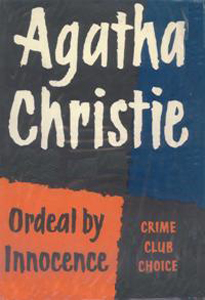Agatha Christie pounds home one theme in “Ordeal by Innocence” (1958). She becomes fascinated by the fact that when everyone in a household is a murder suspect, everyone’s life is ruined except for that of the guilty person, who avoids prison. The innocent must now go through life being suspected of murder, with people looking at them askance and whispering.
Who actually dunit?
The setup is standard: Rachel Argyle, the matriarch of a family of now-adult adopted children is murdered in an English country manor, and anyone could’ve done it. Initially, it appears unstable Jacko is the culprit – he’s arrested, convicted and imprisoned. But then a witness emerges two years later to confirm Jacko’s alibi. Someone else did it.
Christie used the structure of re-opening an old case in the Poirot novel “Mrs. McGinty’s Dead” six years earlier, but “Ordeal” is an improvement. Here, one-off protagonist Arthur Calgary is our amateur detective. The veteran scientist feels horrible that he was on the other side of the globe (Antarctica!) and wasn’t aware the police sought him to confirm Jacko’s alibi.

“Ordeal by Innocence” (1958)
Author: Agatha Christie
Genres: Mystery, family drama
Setting: England, 1958
In an opening segment that hooked me, Calgary tries to work up the nerve to tell the Argyles that Jacko is innocent. He’s shocked by their reaction: Rather than giving them peace of mind, the news does the opposite. They wish they could go on believing Jacko was the killer. It was tidy, Jacko always seemed like the murdering type anyway, and the case was closed.
Christie gets repetitive with this theme. Every member of the household expresses their wish that Calgary hadn’t broken the news (some of them multiple times). Calgary wrings his hands about this twist of human nature through most of the novel before finally grasping it.
This doesn’t make “Ordeal” an ordeal to read, though. Rather, Christie’s obsession with the Argyles’ unease makes the novel an ideal multi-session read – one where you can knock off a few chapters before bed over the course of a week. You’ll never forget its main point, and never find the details overwhelming.
Adopting another theme
Another of “Ordeal’s” points is … a little odd by today’s standards. Christie drives home the notion that the five adopted Argyles aren’t really the children of Leo and the late Rachel. So they can’t have the same bond blood relatives have.
Many adoption-formed families will tell you the bond can be equally tight. Christie’s wider case for the unending tragedy of being an orphan is sketchy. Still, it holds up as a mystery-yarn premise once we accept that for all five Argyle children, it just so happens that the lack of blood relation is an issue.
Rachel wanted so much to give these orphans a good life that they ended up resenting her influence. She’s one of Christie’s most sympathetic murder victims. The children’s motives are their immature reactions to their mother’s love. So the whole thing is rather sad.

A stealth character drama
Christie wrote a handful of non-mystery novels under the name Mary Westmacott, and sometimes she writes stealth Westmacott novels under her own name. “Ordeal” is arguably one of those, because she’s so interested in how this event impacts each Argyle, plus their spouses, lovers, and the loyal housemaid.
(Christie likewise becomes magnetically drawn to her characters in 1946’s “The Hollow,” but that’s a superior novel because of its sense of place. Oddly, “Ordeal’s” location doesn’t resonate even though the house is situated on what was once called Viper’s Point.)
Even Calgary goes from an outsider (who understandably becomes obsessed with the case) to an insider. Christie subtly works in a bond between him and one of the Argyle daughters. This leads to an amusing final line that would be more typical in her earlier novels. She can write complex, believable romances, but she’ll sometimes drop a random “happily ever after” on us. This one made me smile.
As much as “Ordeal” is a character piece, it’s also a solid mystery, if not an inventive one. As usual, I did not guess whodunit. But Christie plays fair; the information I needed was there all along.
In “Mrs. McGinty’s Dead,” a lot of the clues are “off-page”: Until we know key information about someone’s past, we can’t hope to solve the case. By contrast, “Ordeal by Innocence’s” mystery is contained, intimate and clear.
What makes the novel special is that Christie is in an empathetic mood, thinking of the Argyles as people rather than pawns.
Every week, Sleuthing Sunday reviews an Agatha Christie book or adaptation. Click here to visit our Agatha Christie Zone.

